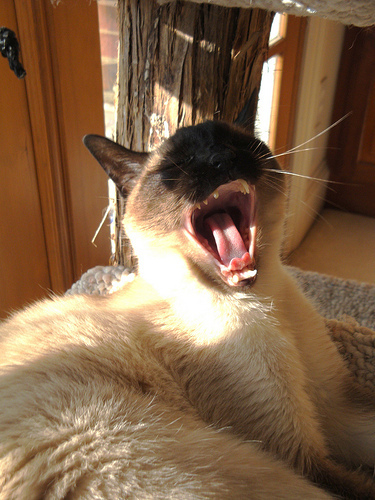Feline Friday: Foiling Furry Insomnia

Last night, I couldn’t sleep. So I got up, climbed the stairs to my office, and worked on the piano score of KURVES, in preparation to share with other theaters (yee-haw!). While I typed, Seren kept me company and decided it was the purr-fect time to play. She woke up Magic, who had been snoozing at the foot of the stairs. So even once I was ready to sleep, the “fur-kids” had lost the urge.
Cats normally sleep up to 16 hours a day and almost never have problems sleeping. Dogs rarely have trouble sleeping, either. They get plenty of naps while you’re at work. They have plenty of energy to stay awake at night to guard the house, play, and pester snoozing owners.
In a house with both cats and dogs the pets may keep each other awake playing throughout the night. Cats are most active at dawn and dusk when mice would be foraging. Nocturnal antics are most common in kittens and usually decrease when the cat reaches 12 to 18 months of age.
When you must arise for work early each morning, midnight games stealing sleep won’t thrill you. There are a number of methods you can use to prompt pets to sleep on your timetable. Here are some tips that work for Magical-Dawg and Seren-kitty.
BEDTIME TIPS
Schedule playtime a half hour before bedtime, and wear out your pets so they’ll crash when you do. Chasing the ball for dogs, or a flashlight beam for cats works well. Magic loves to play hose-tag during these hot steamy days, and Seren adores chasing Da Bird fishing pole toy.
You can also provide a late night meal to keep pets from pestering you at 3 a.m. to fill the bowl. That helps with cats especially. Seren will be quick to complain if her bowl falls empty.
Slow, calm, instrumental music can be soothing and help lullaby pets to sleep. It works for people, too. Actually, slow calm music works well for me, too. I reserve The Chieftans rollicking music for when I need energy, and play my cello CD’s to help me concentrate or snooze.
The time-keeper hormone melatonin tell us when to sleep and when to wake up and has been used in people to treat jet lag and sleep disorders. Some veterinarians recommend using it to help pets sleep, too. Melatonin is available at health food stores (not quite as tasty), but you’ll need to ask your vet for the proper dosage.
Milk contains the chemical tryptophan that helps promote sleep. A quarter cup of warm milk as a bedtime snack may help pets snooze more readily. However, some dogs and cats don’t digest milk easily so nix the snack if diarrhea develops. The fur-kids are quick to point out that tryptophan is also found in turkey.
Do your pets never hit the snooze button when you need your beauty rest? How do you deal with the late night high jinx? Please share suggestions. I may need to invest in ear plugs.
I love hearing from you, so please share comments and questions. Do you have an ASK AMY question you’d like answered? Do you have a new kitten and need answers? Stay up to date on all the latest just subscribe the blog, “like” me on Facebook, listen to the weekly radio show, check out weekly FREE PUPPY CARE newsletter, and sign up for Pet Peeves newsletter. Stay tuned for more news about my forthcoming THRILLER, LOST & FOUND!
Filed under: Uncategorized




